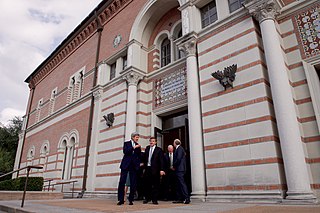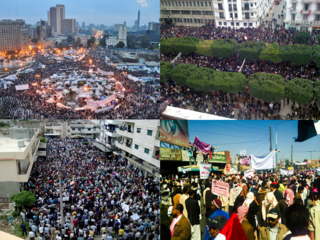
"Rice University's Baker Institute for Public Policy", also known as the "Baker Institute", is an American think tank housed on the campus of Rice University in Houston, Texas. Founded in 1993, it functions as a center for public policy research. It is named for James A. Baker, III, former United States Secretary of State, Secretary of the Treasury, and White House Chief of Staff. It is directed by Ambassador David M. Satterfield and funded mainly by donor contributions, endowments, and research grants.

American democracy promotion aims to encourage governmental and non-governmental actors to pursue political reforms that will lead ultimately to democratic governance.

The 2011 Egyptian revolution, also known as the 25 January Revolution, began on 25 January 2011 and spread across Egypt. The date was set by various youth groups to coincide with the annual Egyptian "Police holiday" as a statement against increasing police brutality during the last few years of Hosni Mubarak's presidency. It consisted of demonstrations, marches, occupations of plazas, non-violent civil resistance, acts of civil disobedience and strikes. Millions of protesters from a range of socio-economic and religious backgrounds demanded the overthrow of Egyptian President Hosni Mubarak. Violent clashes between security forces and protesters resulted in at least 846 people killed and over 6,000 injured. Protesters retaliated by burning over 90 police stations across the country.

The Arab Spring or the First Arab Spring was a series of anti-government protests, uprisings and armed rebellions that spread across much of the Arab world in the early 2010s. It began in Tunisia in response to corruption and economic stagnation. From Tunisia, the protests then spread to five other countries: Libya, Egypt, Yemen, Syria and Bahrain. Rulers were deposed or major uprisings and social violence occurred including riots, civil wars, or insurgencies. Sustained street demonstrations took place in Morocco, Iraq, Algeria, Lebanon, Jordan, Kuwait, Oman and Sudan. Minor protests took place in Djibouti, Mauritania, Palestine, Saudi Arabia and the Moroccan-occupied Western Sahara. A major slogan of the demonstrators in the Arab world is ash-shaʻb yurīd isqāṭ an-niẓām!.

The Egyptian Crisis was a period that started with the Egyptian revolution of 2011 and ended with the installation of a counterrevolutionary regime under the presidency of Abdel Fattah el-Sisi in 2014. It was a tumultuous three years of political and social unrest, characterized by mass protests, a series of popular elections, deadly clashes, and military reinforcement. The events have had a lasting effect on the country's current course, its political system and its society.

The following is a chronological summary of the major events that occurred during the Egyptian Revolution of 2011, after Hosni Mubarak's resignation. Protests and riots led to the deaths of hundreds, injuries of thousands and the arrests of tens of thousands. Millions have mobilised the streets since the revolution.

Essam Abdel-Aziz Sharaf is an Egyptian academic who was the Prime Minister of Egypt from 3 March 2011 to 7 December 2011. He served as Minister of Transportation from 2004 to 2005.

Hamdeen Sabahi is an Egyptian politician, journalist. He is currently the leader of the Egyptian Popular Current and a co-leader of the National Salvation Front. An opposition activist during the Anwar Sadat and Hosni Mubarak eras, Sabahi was jailed 17 times during their presidencies for political dissidence. He was an immediate supporter and participant of the 2011 Egyptian revolution. Sabahi entered the 2012 Egyptian presidential race in which he finished third place with 21.5% of the vote trailing the second place candidate Ahmed Shafiq by a margin of 700,000 votes. In the 2014 presidential election he was one of just two candidates. He ran second with less than 4% of the vote. Abdel Fattah el-Sisi was declared the winner after attracting 22 million of the nearly 23 million votes cast. Sisi was sworn into office as President of Egypt on 8 June 2014.
Steven A. Cook is the Eni Enrico Mattei senior fellow for Middle East and Africa studies at the Council on Foreign Relations (CFR). He is the author of False Dawn: Protest, Democracy, and Violence in the New Middle East. He is also the author of The Struggle for Egypt: From Nasser to Tahrir Square and Ruling But Not Governing: The Military and Political Development in Egypt, Algeria, and Turkey. Cook contributes regularly to foreign policy journals such as Foreign Affairs, Foreign Policy, The Atlantic, and The New Republic. He also runs a blog about Middle Eastern politics and history.

Bassem Raafat Mohamed Youssef is an Egyptian-American comedian, television host, and surgeon. He is best-known in his media career for having hosted Al Bernameg, a satirical comedy show focused on Egyptian politics, from 2011 to 2014. Youssef's comedic style has led to him being dubbed "Egypt's Jon Stewart" after Stewart's satirical The Daily Show, which had itself inspired Youssef to pursue a career in television. In 2013, Youssef was named on Time 100. His current projects include The Democracy Handbook and Revolution For Dummies.

Al-Bernameg was an Egyptian news satire program. The show was hosted by Bassem Youssef on the free-to-air channel MBC Masr and reruns are aired on Deutsche Welle; it was formerly broadcast on the satellite channels CBC and OnTV Egypt. Bassem Youssef announced on 2 June 2014 that the show was cancelled.
Al-Monitor is a news website launched in February 2012 by the Syrian-American entrepreneur Jamal Daniel. Based in Washington, D.C., Al-Monitor provides reporting and analysis from and about the Middle East.

The Egyptian Popular Current is a movement in Egypt, created after the 2012 presidential elections by former presidential candidate Hamdeen Sabahi. The movement was formed on 21 September 2012. The movement formed the Popular Current Party on 21 September 2014.

The 2012–2013 Egyptian protests were part of the crisis in Egypt including the June 2013 protests, the July 2013 coup d'état, and part of the post-coup unrest. They saw varying opposition against three contiguous heads of state; namely, the Supreme Council of the Armed Forces (SCAF), Muslim Brotherhood, and the de facto ruling Egyptian Armed Forces.

The 30 June revolution occurred in Egypt on 30 June 2013, marking the one-year anniversary of Mohamed Morsi's inauguration as president. The events ended with the 2013 Egyptian coup d'état after mass protests across Egypt demanding the immediate resignation of the president. The rallies were partly a response to Tamarod, an ostensibly grassroots movement that launched a petition in April 2013, calling for Morsi and his government to step down. Tamarod claimed to have collected more than 22 million signatures for their petition by June 30, although this figure was not verified by independent sources. A counter-campaign in support of Morsi's presidency, named Tagarod, claimed to have collected 26 million signatures by the same date, but this figure was also unverified and not mentioned in media nearly as much as Tamarod's, with no reliable sources repeating it. The movements in opposition to Morsi culminated in the June 30 protests that occurred across the country. According to the Egyptian military, which calculated the number of protesters via helicopter scans of demonstration perimeters across the country, the June 30 protests had 32 million protesters, making them "the biggest protests in Egypt's history." However, independent observers raised concerns that the Egyptian government exaggerated the actual number of anti-Morsi protestors, with some research determining that only around one to two million people protested across the country against Morsi.
Nancy Okail is an Egyptian activist and a scholar with a focus on security, human rights, democracy and power relations of foreign aid. In 2013, Okail was sentenced in absentia to five years in prison in the controversial Egyptian court case against local and foreign non-governmental organization (NGOs).

Cairokee is an Egyptian rock band that was officially launched in 2003 but came to prominence with its revolutionary music following the Egyptian Revolution of 2011 due to its politically-inspired lyrics and protest songs released following the uprising. Their title song "Ya El Midan", featuring Aida el Ayoubi, who had retired in the 1990s, ranked number one on Facebook worldwide for downloads and number eight on YouTube.
Bassem Sabry (25 October 1982 – 29 April 2014) was an Egyptian journalist, blogger, civil rights campaigner who had reported extensively on the Egyptian Revolution and the founder of COMET which stands for “Conference on marketing, economics and trade”. Al-Monitor eulogized him as being "widely considered to be among the most incisive and respected analysts of the country’s politics." He died on 29 April 2014 at the age of 31 in an ostensible accident after falling from the balcony of a Cairo apartment.

Hassan Hassan is an American author and journalist of Syrian origin. He co-wrote the 2015 New York Times bestseller ISIS: Inside the Army of Terror with Michael Weiss. He has written on Islamist groups in the Middle East. He frequently appeared on The O'Reilly Factor, Amanpour and The Last Word with Lawrence O'Donnell, and has written for The New York Times, Foreign Policy, The Guardian, The Atlantic, Foreign Affairs, Financial Times, and The Daily Beast, among others. Hassan is the founder and editor-in-chief of New Lines Magazine, a global affairs magazine.

Iyad el-Baghdadi is a writer, entrepreneur, and human rights activist who attained international prominence during the Arab Spring. A self-styled "Islamic libertarian," he is an outspoken critic of both Islamic movements and secular dictatorships, and has set himself apart from many other activists through his use of humor and sarcasm. He contributes to his own blog site Islam and Liberty and podcast Arab Tyrant Manual on Soundcloud.
















